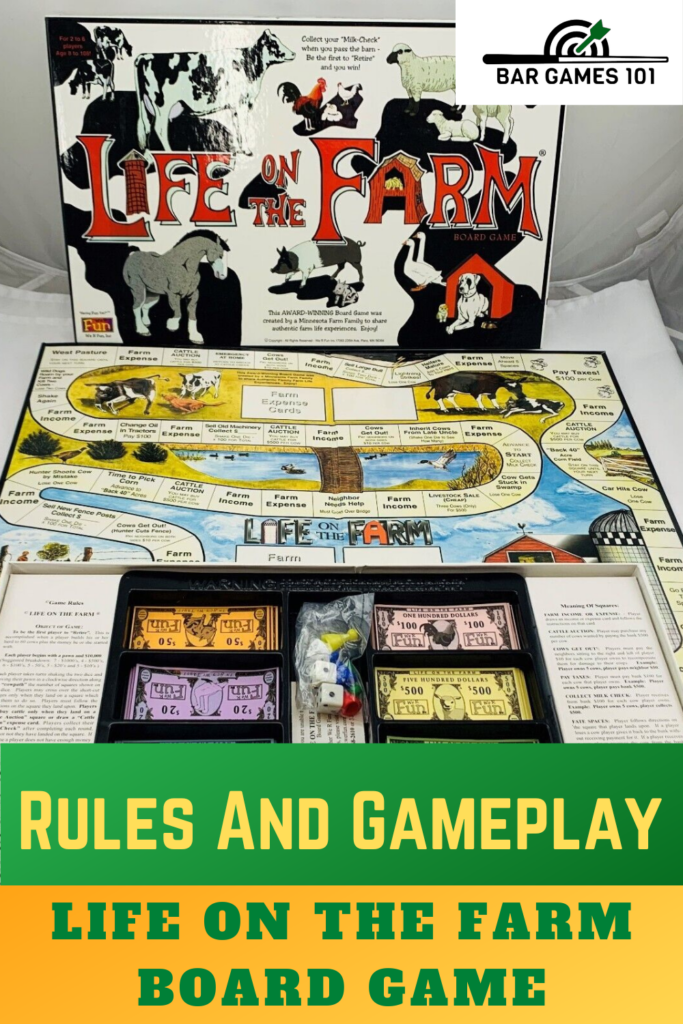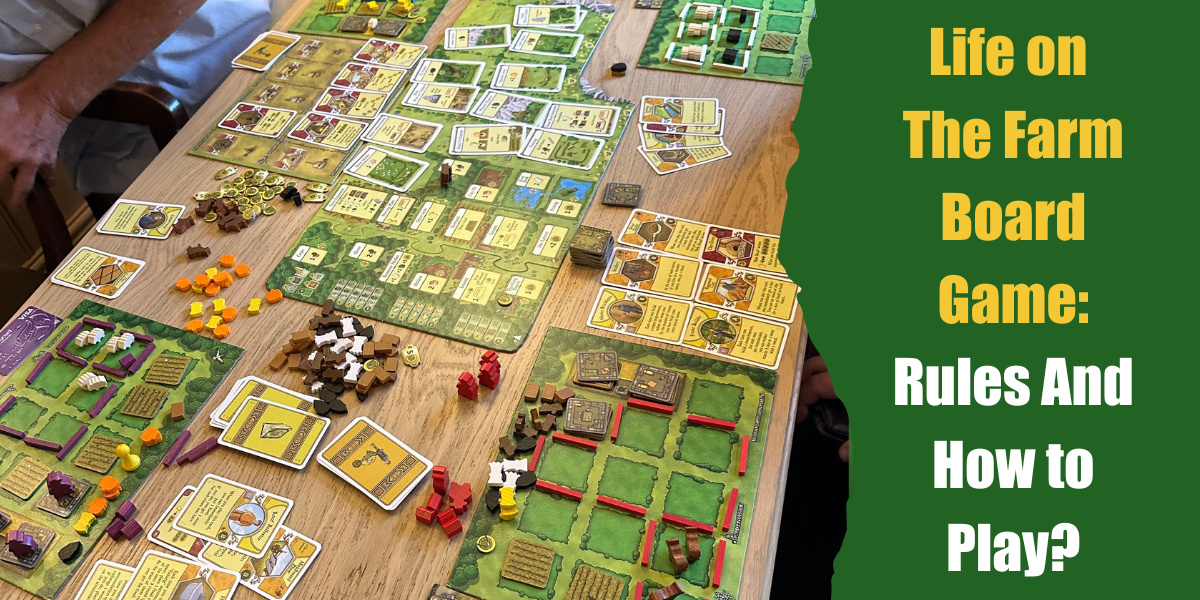Life on The Farm is an engaging and immersive board game that invites players to experience the joys and challenges of running a farm.
Set in a vibrant rural landscape, this game offers a unique opportunity to delve into the world of agriculture, strategic decision-making, and resource management.
In this guide, I will explore the intricacies of playing Life on The Farm by examining its components, rules, gameplay mechanics, and strategies. By understanding the fundamental aspects of the game, you can immerse yourself in a rich and rewarding experience, making critical choices to build a prosperous farm.
From setting up the game to advancing through the different phases, I will provide you with a comprehensive guide that enables newcomers and seasoned players to make the most of their farming adventures.
So, grab your virtual pitchforks and prepare to sow the seeds of success in Life on The Farm board game as we delve into the mechanics and strategies to help you cultivate a thriving agricultural empire.
Life on The Farm Board Game – An Overview
So, before we delve into the aim of the game, let’s first take a quick look at what you’ll need to play and who the game is best suited to.
Personally, I prefer to play this game with four people. It adds more structure to the game. However, it does work with as little as two players.
Regarding the target audience, this game is pretty versatile, and I’ve found that people of all ages can enjoy it, from kids to my grandparents, making it an excellent game to play with the family.
If you like games such as Monopoly, chances are you’ll love this, as some of the game mechanics are pretty similar. What I mean by this is the fact that your main goal is to manage your money and properties to help build a thriving agricultural farm. Basically, you need to make more money than the other players in order to win.
Discover the immersive world of Life on The Farm board game, now conveniently accessible on Amazon. With just a few clicks, you can bring the joy of farming straight to your doorstep, as this captivating game is delivered right to your door.
So, now that you’ve understood the game let’s find out how to play, shall we?
How to Play Life on The Farm Board Game?

So, let’s look at it this way, the main objective here is to retire from the world of agriculture by making enough money. But it’s not all about the cash because you’ll also need a herd of 60 cows.
At the start of the game, you’ll have a bunch of cash (not real, of course), which will equate to $10,000. You’ll also have a pawn to move around the board.
The game moves in a clockwise direction and is done by moving with the role of a dice. Along the way, you might find yourselves on squares that tell you you can take a shortcut over a bridge or on squares that enable the purchase of cows. Only when you land on these spaces can you perform the actions.
You can also purchase cows if you pick up a cattle auction expense card.
Buying cows is, of course, the aim here. However, all can be lost in the blink of an eye because if at any point you find yourself low on funds, you’ll have to sell some of your cows to the bank for $300 a pop.
If you’re still struggling for loot even after selling your beloved cows, you’re out. Bad luck!
Expense Cards And Farm Income
At certain times in the game, you’ll get the chance to withdraw a card which will give you specific instructions. When income or expense is declared as cash, the market value is determined by the role of a dice. Each number on the dice represents $100.
1. Cow Cards
Cow cards keep track of your moo-ving cattle count, so it’s easy to know how many cows each player has throughout the game.
2. Slaughter
If you pick a card that reads “Slaughter one cow – collect $300”, you must give up one of your cows to the bank and collect $300 in its place. If you don’t have any cows to sacrifice at this point, you cannot collect the cash from the bank.
3. Cattle Auction
There are also cattle auction cards that enable you to purchase as many cows as you like for $500 a cow.
4. Cows Get Out
If you get one of these, you’ll have to pay each of your neighbors $10 for each cow they own, which will compensate them for any lost crops.
5. Pay Taxes
You need to pay the bank $100 for each cow you own. This can be pretty hefty, considering how well you’re doing at the game.
6. Collect Milk Check
On the flip side, if you get one of these lucky cards, you’ll receive $100 for each cow you own from the bank. Bonus!
7. Fate Spaces
This simply means following the instructions of the square you’ve landed on. If the square tells you to lose a cow to the bank, you won’t be compensated in cash. On the contrary, if you receive a cow, you won’t have to pay for it. If you land on a livestock sale square, you’ll have a discount on your cows, and you can purchase three cows for $500.
Strategies And Handy Tips For Life on The Farm Board Game
Although the game mechanics are pretty much straightforward, there are a few things you tweak that can give you a slight advantage.
- Invest Wisely: Consider things like market value, cattle purchases, and potential growth, and allow for any charges you might incur along the way.
- Watch Your Expenses: This is vital for maintaining your farm’s economy. Pay close attention to your income, expense cards, and anything that might impact your finances.
- Plan for Taxes: Don’t forget about the implications of owning a thriving farm, and be sure to set aside money for taxes. Budgeting is everything.
- Keep an Eye on Your Opponents: Closely observe your opponents’ moves, herd sizes, and financial situations so that you can adjust your strategies accordingly.
- Expect the Unexpected: Remember, anything can happen, and all can change with a single dice roll. So, expect the twists and turns, try to stay flexible and be prepared to take calculated risks when necessary.
- Don’t Neglect Your Neighbors: Ensure you compensate your neighbors for any damage caused by your cows to keep good relations with them and prevent financial drains or potential conflicts.
- Utilize Short-Cut Bridges: Use these bridges wherever possible. They can save you valuable turns and significantly speed up your progress.
Winning The Game
As the game progresses, players strive to build their herds and accumulate wealth in their quest for retirement.
The anticipation builds as the final stages approach. The end of the game draws near when a player successfully reaches the milestone of 60 cows, along with the money they started with.
This achievement triggers the retirement phase. Players eagerly count their cows and tally their wealth, hoping to be the first to declare retirement.
The excitement peaks as each player’s fate hangs in the balance. The player who retires first emerges as the triumphant farmer, securing their place as the master of Life on The Farm.
Rounding up The Herd
In conclusion, Life on The Farm has been an enjoyable and engaging board game that has allowed me to experience the ups and downs of farm life in a fun and interactive way. From carefully managing my funds to strategically buying cattle, the game has challenged my decision-making skills and offered a glimpse into the world of farming.
Playing Life on The Farm with friends and family has provided moments of laughter and friendly competition. It has been a source of entertainment and a way to bond with loved ones, creating lasting memories.
Overall, the game offers a balanced mix of strategy and luck, keeping players engaged throughout the game. Whether you’re a seasoned gamer or new to board games, this game provides an accessible and enjoyable experience.


